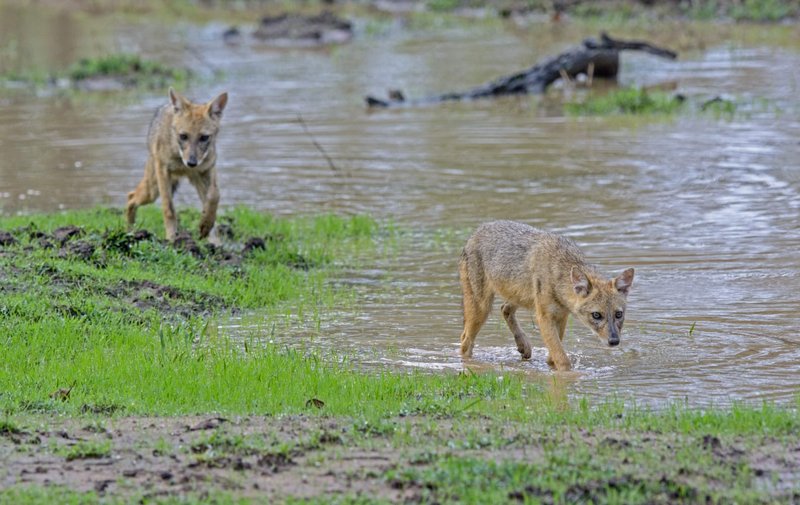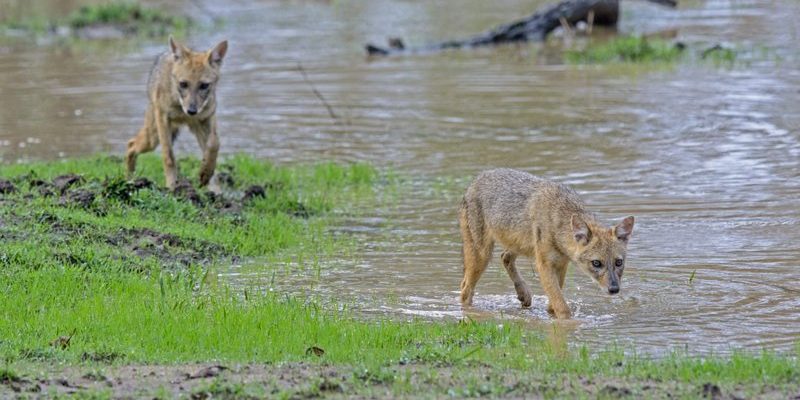
Jackals are generally found in parts of Africa and Asia, thriving in diverse environments like savannas and deserts. With their keen instincts and resourceful nature, they manage to not just survive but also nurture their young in a way that sets them up for success. Let’s dive into the world of jackal parenting and discover how these animals create a supportive environment for their pups.
The Life Cycle of Jackals
To understand how jackals raise their young, it helps to first know their life cycle. Jackals typically reach sexual maturity at around one year old. Mating usually occurs between January and March, and after a gestation period of about 60 to 65 days, the female gives birth to a litter of 2 to 8 pups. That’s a lot of little jackals to care for!
When the pups are born, they are blind and helpless, relying entirely on their parents for survival. The scene is reminiscent of a new parent trying to navigate the challenges of infant care—everything is new and requires constant attention. The mother typically takes the lead in nurturing, providing warmth and feeding, while the father often plays a vital role in bringing food back to the den.
The Role of the Den
Jackals are quite strategic about their choice of den, which is crucial for raising their young. They often select a hidden spot that offers protection from predators and harsh weather. This might be a burrow abandoned by another animal or a secluded spot in tall grass.
Once the pups are old enough to leave the den at around three weeks, this space becomes their home base for exploration. Think of it as a safe haven in a bustling city—a place where they can retreat and gather their strength before heading out into the wider world. Parents diligently guard this area, ensuring that their little ones are safe from threats while they learn about their environment.
Feeding the Pups
Feeding is a crucial aspect of jackal parenting. The mother primarily nurses the pups until they’re about five weeks old. After this, she begins to introduce them to solid food. This transition is like moving from baby food to regular meals for kids. The father plays a significant role here too, often hunting small animals or scavenging for food to bring back to the den.
In the wild, jackals are opportunistic feeders, meaning they eat whatever is available. This flexibility allows them to provide a varied diet for their pups, which is important for their growth and health. Honestly, having a well-rounded diet is just as important for jackals as it is for us! A strong foundation in nutrition helps ensure that the pups become healthy, strong adults capable of thriving on their own.
Teaching Life Skills
As the pups grow, the parents start teaching them essential life skills. This education is ongoing and involves demonstrating how to hunt, scavenge, and avoid dangers. It’s like sending kids to school every day, full of new lessons and experiences.
From around two months old, the pups begin to accompany their parents on hunts. They learn the ropes gradually, practicing their stalking and pouncing skills. The family works together, much like a team in a sports game, communicating and supporting each other to catch their next meal. It’s a natural way of ensuring that the young jackals have the skills they need to survive when they eventually leave the family unit.
The Importance of Social Bonds
Jackals are known for their tight-knit family structure, which plays a significant role in raising their young. The social bonds among family members are essential for the pups’ development. These relationships encourage cooperation and teamwork, teaching the pups how to interact socially, which is crucial for life in the wild.
In many cases, siblings will help care for one another, sharing the responsibility of play and learning. It’s a supportive network where every member plays a part—kind of like a family that bands together to help each other out. These early interactions help the pups develop essential social skills, ensuring they can adapt and thrive in their future packs.
When Do Young Jackals Become Independent?
Young jackals typically start to disperse and establish their territories around 6 to 12 months of age. It’s a bittersweet moment for the parents, who have invested so much time and energy into nurturing their young. But just like humans, the goal is to prepare them for independence.
The transition can be gradual, with the young jackals lingering around for a while before fully venturing out on their own. As they start to explore and hunt independently, their parents continue to offer guidance and support. This nurturing phase is crucial for building confidence in their offspring as they step into a broader, sometimes perilous world.
The way jackals raise their young is a beautiful blend of instinct, strategy, and care. From choosing the perfect den to teaching crucial survival skills, every aspect of their parenting speaks to their adaptability and intelligence. Jackals show us that raising young in the wild is all about teamwork, connection, and learning—just like in our own lives.
So, the next time you hear a jackal call echoing through the wild, think about the family dynamics at play behind the scenes. Their nurturing approach is a reminder of how important community and support are, not just for animals, but for all of us. Whether in the heart of the savanna or your own backyard, the journey of raising young is an adventure filled with challenges, love, and growth.

